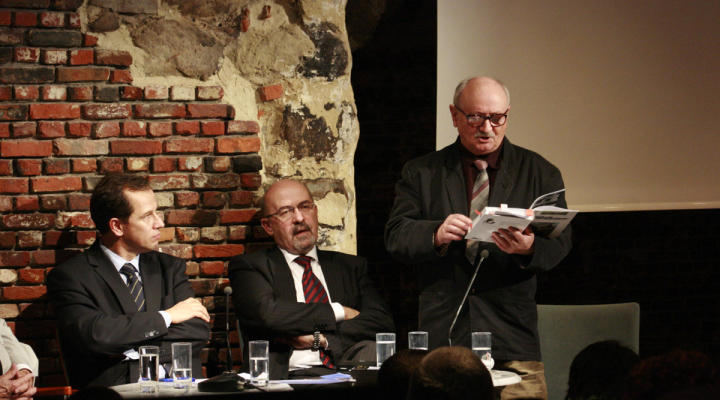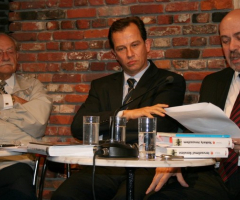The fate of the Szekler Sabbatarian community, presented in Brussels
DAHR’s MEP Csaba Sógor organized a debate about the fate of the Szekler Sabbatarian community and the issues of minority identity on the 18th of October in Brussels at the Balassi Institute. The MEP’s guests were the Transylvanian author of the book that gave the title of the debate, Géza Szávai who has been living in Budapest since 1988, Breton university professor Bernard Le Calloc'h, Romanian deputy Prime Minister and poet Béla Markó and Gyula Miholcsa, editor of the Hungarian programs of the Romanian Television.
Author of the "Les Sabbattaires de Transylvanie" (Sabbatarians of Transylvania), Professor Bernard Le Calloc'h spoke in Hungarian about the fate of the community that lived in double state of minority. His historical presentation was reflected upon by MEP Csaba Sógor.
- The story of the Szekler Sabbatarians is interesting because the life of this community is a good example of the relationship between Transylvania’s golden age and economic growth, religious tolerance and the peaceful coexistence of religions and ethnicities. Their town has become a symbol of the way villages had been destroyed in Romania. Their message is that not only communities, their culture and religions disappear, but a whole country can become economically unstable if it focuses its energy on assimilation and oppression of minorities – the Hungarian MEP from Transylvania explained.
The French edition of Géza Szávai’s essay novel “Szekler Jerusalem” was published by the Pont Editing House on the occasion of the Hungarian Presidency of the Council of the European Union. Szávai spoke about the circumstances of the publishing, as well as about the editorial and literary creed behind the volume. He welcomed the audience as “members of a small team with European spirit”. In his view, the appearance of another translation of the Szekler Jerusalem is important because through the book can one fully recognize who his friends are, and in general what is alterity about. By reading about the tragedy of those in Bezidu Nou in as many languages as possible, foreign audiences can realize that something that is used to be considered a curiosity is in fact an absurd and authoritarian series of actions aimed at destroying the values of a community.
Béla Markó considers Szávai’s book to be a piece of political literature that speaks about tolerance, while being an autobiographical statement and a historical chronicle as well. He called it a true piece of literature that analyzes the roots and questions of identity, records events of everyday life with documentary value that “answers questions about who we are, where we come from and where we are heading, people of different languages, cultures and religions: Europeans.”
The event closed with the projection of Gyula Miholcsa lyric documentary film composition. The 14 minute film was compiled by the author especially for the book presentation in Brussels, from archive footage of the Romanian Television and his own materials. The film is a European memento against the destruction of the cultures of small minority communities.












